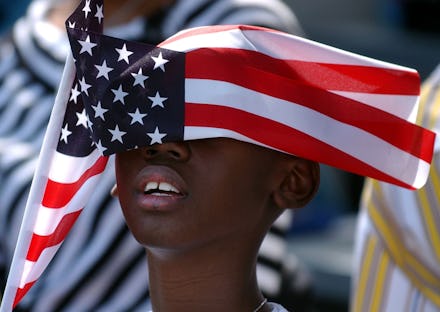7 ways black people still aren't free in America

"What to the slave is the 4th of July?"
That's the question Frederick Douglass asked during a speech in Rochester, New York, on July 5, 1852. That speech, titled "The Meaning of July 4th to the Negro," is among Douglass' most famous public addresses in part because it focuses on the irony of a country celebrating its freedom while holding millions of people in bondage.
But there's another reason why Douglass' words still resonate 150 years later. It's that his fundamental question still remains. How are black people in America, still mired in institutional racism created by slavery and white supremacy, supposed to celebrate their country?
By no stretch of the imagination are black people still slaves in America. But the institutions created by slavery, namely white supremacy, still dictate black lives daily. Nowhere is this reality as stark today than in our criminal justice system.
Black people are imprisoned in exceptionally high numbers.
African-Americans make up one million of America's 2.3 million prisoners, according to the NAACP. They're incarcerated at a rate that's six times higher than that of whites. And those numbers have exploded since the 1970s, when America's War on Drugs exploded the country's overall prison population.
Black people are more likely to be arrested for nonviolent offenses.
As more and more people were sent to prison for drug-related crimes, black people fared worse than other groups. According to the American Civil Liberties Union, black people are 3.2% more likely to be arrested for possession of marijuana than their white peers, even though blacks and whites use the drug at similar rates.
Black people are more likely to be sentenced to death for crimes against white people.
Since the death penalty was reinstated in 1976, 80% of people who have been executed have been put to death for crimes against white people — even though blacks and whites are likely to be murder victims at roughly equal rates, according to the Death Penalty Information Center.
Black people are less likely to be judged by a jury of their peers in criminal trials.
Studies have found that racism is common in jury selection. The practice is so common that the Supreme Court ruled in May that a black man named Timothy Foster on death row in Georgia could be granted a new trial because he was convicted by an all-white jury. "Even after the undeniable evidence of discrimination was presented in this case, the Georgia courts ignored it and upheld Foster's conviction and death sentence," said Foster's lawyer, Stephen Bright after the Supreme Court's ruling.
Black children are more likely to be disciplined in school than their white peers.
The pipeline to prison starts early. Black children are more likely to be disciplined and suspended from school than their white peers starting as early as pre-school. That's the beginning of what experts call the school-to-prison pipeline, which slowly puts kids on the path to incarceration.
Each day, 500,000 people fill America's jails awaiting trial because they are too poor to afford bail. Most of them are black.
Americans are technically innocent until proven guilty, but hundreds of thousands of people sit in prison every day because they're too poor to afford bail. In 2013, a study from the Vera Institute found that 50% of people awaiting trial couldn't afford bail of $2,500 or less.
Even black men who do not have criminal records are less likely to be hired for jobs than white men who've been convicted of felonies.
While a criminal record can prevent a person from any race from having a fair shot at getting a job, one study found that even when a black man doesn't have a criminal record, he's less likely to be considered for certain positions than white men with felony convictions.
For black America, freedom isn't a guarantee of American citizenship.